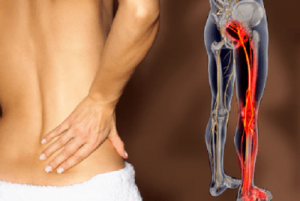Infusions and Tips To Relieve Sciatica Symptoms


Reviewed and approved by the doctor Gilberto Adaulfo Sánchez Abreu
When the sciatic nerve becomes inflamed, it can cause pain in the buttocks that goes down the back of the thigh; many times, this pain may extend along the entire leg down to the ankle. Because it can be a very intense pain, it’s important to know about the different ways to relieve sciatica symptoms.
To relieve sciatica symptoms, you can use some anti-rheumatic and analgesic herbs, taken as infusions or applied as a compresses.
Symptoms that indicate inflammation of the sciatic nerve
- There is sharp pain that goes from the buttocks down the back of the leg, often reaching near to the ankle.
- It’s difficult to perform some simple movements, such as turning over in bed.
- When you have to spend a lot of time on your feet, the pain keeps increasing until it becomes unbearable.
- When the inflammation is very severe, you cannot find relief or improvement in any position.
- The person who experiences this kind of inflammation feels very incapacitated due to the pain and discomfort.
You may like:
Infusions that help relieve sciatica symptoms

Turmeric infusion
This is a highly recommended herb for to relieve the symptoms of sciatica, because it has tremendous anti-inflammatory properties. You can use it to make a tea with a few sprigs in a pint of water and drink it three to four times a day.
Variety infusion
Ingredients
- Yarrow
- Wild Pansy
- Marjoram
- Elderberry flowers
- Dandelion
How to make it
You should use ten grams of each of these dried plants. Then crush them and mix them together well. Boil a cup of water and add a tablespoon of these herbs. Cover and let it stand for five minutes. Finally drink two cups a day.
Check out:
Carrot juice and parsley

This is a juice that’s could potentially help to relieve sciatica symptoms. You can make it by blending carrots with some sprigs of parsley into a smoothie and then drinking one glass a day. It doesn’t matter what time of the day you choose to drink it.
We also recommend to take a clove of garlic with a glass of pineapple juice on an empty stomach. Don’t add sweeteners.
Supplements that may help relieve the symptoms of sciatica
Quercetin
This is a bioflavonoid that’s usually found in fruits and vegetables, it can be found in greater amounts in onions and apples. It’s a rich antioxidant that has the ability to protect cells from the damaging effects of free radicals.
Bromelain
This is an enzyme that can be found mainly in pineapple, said enzyme has the ability to reduce inflammation caused by sciatica.
Spirulina
This is a food that contains large amounts of minerals and vitamins, with the ability to nourish the nervous system and cleanse the body by eliminating fats and toxins.
Compresses and poultices to relieve sciatica symptoms
- Apply a compress of green clay on the affected area to help reduce inflammation and to relieve pain. Do it with a gentle massage.
- Make a poultice by adding a tablespoon of olive oil to ground ginger root. Apply as a compress with a gentle massage. You can repeat this several times a day.
All cited sources were thoroughly reviewed by our team to ensure their quality, reliability, currency, and validity. The bibliography of this article was considered reliable and of academic or scientific accuracy.
- Ara, A., Los grandes remedios naturales. Vol. 130. Edaf, 2003.
- Díez García, M.A., Beika Mentxaca, I., and Heerrero Erquíñigo, J.L. (2003). Lumbalgia y ciática. Farmacia Profesional 17, 66–74.
- Gutiérrez Mendoza, I., López Almejo, L., Clifton Correa, J.F., and Navarro Becerra, E. (2014). Síndrome del piramidal (piriforme). Medigraphic 10, 85–92.
- Pérez-Guisado, J. (2006). Lumbalgia y ejercicio físico. Revista In 6, 230–247.
This text is provided for informational purposes only and does not replace consultation with a professional. If in doubt, consult your specialist.








